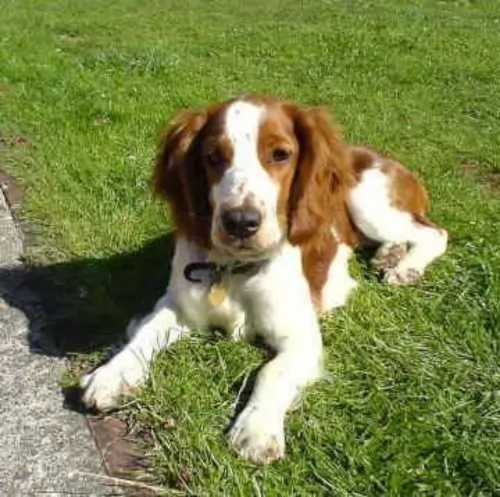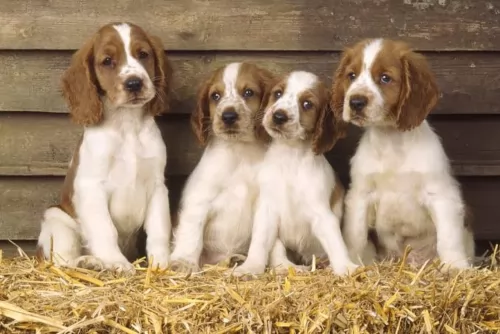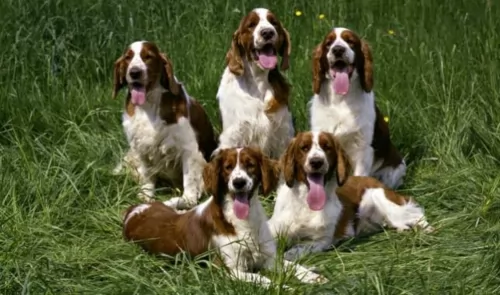 Petzlover
Petzlover Saluki is originated from Iraq but Welsh Springer Spaniel is originated from United Kingdom. Saluki may grow 23 cm / 10 inches higher than Welsh Springer Spaniel. Saluki may weigh 10 kg / 23 pounds more than Welsh Springer Spaniel. Both Saluki and Welsh Springer Spaniel has same life span. Both Saluki and Welsh Springer Spaniel has almost same litter size. Both Saluki and Welsh Springer Spaniel requires Moderate Maintenance.
Saluki is originated from Iraq but Welsh Springer Spaniel is originated from United Kingdom. Saluki may grow 23 cm / 10 inches higher than Welsh Springer Spaniel. Saluki may weigh 10 kg / 23 pounds more than Welsh Springer Spaniel. Both Saluki and Welsh Springer Spaniel has same life span. Both Saluki and Welsh Springer Spaniel has almost same litter size. Both Saluki and Welsh Springer Spaniel requires Moderate Maintenance.
 It seems as though the Saluki's origins go far back to ancient Egypt times. The dog is known for its superb hunting abilities.
It seems as though the Saluki's origins go far back to ancient Egypt times. The dog is known for its superb hunting abilities.
These dogs have been known in the Middle East and could be found in Iran and Egypt too. Breeding with other dogs was forbidden so the Saluki has remained unchanged for thousands of years.
It has always been known over the centuries for its superb grace and speed as well as endurance. He is capable of that because of the tall, sleek, muscular body and long, narrow head.
The Saluki came to England in the 1900s, and today the dog comes in quite a few variations.
 The Welsh Springer Spaniel is thought to be an old Land Spaniel similar to the English Springer Spaniel. They were pretty mush an unknown breed until they won a string of dog trials and became more popular. Following this surge the breed was recognized by the UKC in 1902 and were named the Welsh Springer Spaniel. No one really knows when the breed was developed and cannot be traced because of lack of documentation. They were brought to America in the early 1900’s and were recognized as a breed by the AKC (American Kennel Club) in 1906.
The Welsh Springer Spaniel is thought to be an old Land Spaniel similar to the English Springer Spaniel. They were pretty mush an unknown breed until they won a string of dog trials and became more popular. Following this surge the breed was recognized by the UKC in 1902 and were named the Welsh Springer Spaniel. No one really knows when the breed was developed and cannot be traced because of lack of documentation. They were brought to America in the early 1900’s and were recognized as a breed by the AKC (American Kennel Club) in 1906.
There are images of a dog looking a lot like the Welsh Springer Spaniel in old prints and pictures. The pictures are of a dog known as a Land Spaniel very much like the Welsh Springer Spaniel. These dogs were thought to be preserved by the Welsh and originally called the Welsh Starter. It was a hunting breed working with falcons.
At one point the breed was called the Welsh Spaniel and was also in the UK studbook as a Cocker Spaniel or a Welsh Cocker. There were several different types of Cocker Spaniels including the English Cocker, the Welsh Cocker, the Devonshire Cocker. The Welsh Cocker Spaniel was a solid dark color while the Welsh and Devonshire Cockers were liver colored.
Following World War II there were no dogs left in Wales or anywhere else in the United Kingdom whose parents were registered pedigree. The unregistered dogs were used to restart the breed and these dogs are the ancestors of the modern Welsh Springer Spaniel.
The breed is still rare with only 299 registered in the UK in 2016. They are listed now a vulnerable Native Breed.
 The Saluki is a graceful, elegant looking dog, deep chested and long legged, much like the Greyhound and fairly closely related to the Afghan Hound.
The Saluki is a graceful, elegant looking dog, deep chested and long legged, much like the Greyhound and fairly closely related to the Afghan Hound.
They stand at between 58 and 71cm and weigh between 16 to 29kg. The head is long and narrow, the eyes large and the dog has floppy ears. The tail is long and curved. The coat of the Saluki comes in a number of different colours and these can be fawn, cream, white, tan, some black or it can have a blend of all these colours. The coat of this dog comes in two types - smooth and the feathered type. The fur is always beautifully silky and is considered to be low-shedding.
These dogs are also very fast runners, and if you check the Guinness Book of Records, you’ll see that the Saluki is listed there as being one of the fastest dogs with tremendous stamina.
Th Saluki is a beautiful, quiet, dignified, reserved, loyal dog. You can just see that he is intelligent. He is certainly affectionate with his human family but you wouldn’t call him demonstrative. He isn’t the kind of dog to be wildly prancing around wagging his tail furiously.
He’s the kind of dog that likes to give chase so you’ll need a large garden for him. It’s why he isn’t suited for city life on a small property. The countryside is a far better option for this tall dog.
When he’s not outdoors, he can easily curl up on your sofa for a few hours of utter relaxation. Training and socialization will be necessary for this shy dog as it not only makes him obedient, but it gives him some confidence with knowing how to behave in different circumstances. He’ll get on well with older children, but is fairly indifferent and intolerant to small kids, especially those that are undisciplined and left to climb over him.
 The breed is a medium size, solid and compact dog bred to work. Their forequarters are angled and there hindquarters are well developed. This is a very good looking breed that is only red with white markings. A hard working dog bred to hunt. They are slighter longer than tall and are not penalized as long as the height tis not greater than the length.
The breed is a medium size, solid and compact dog bred to work. Their forequarters are angled and there hindquarters are well developed. This is a very good looking breed that is only red with white markings. A hard working dog bred to hunt. They are slighter longer than tall and are not penalized as long as the height tis not greater than the length.
The tail in docked except in countries where it is illegal to do so. Their eyes should be brown. Noses are black or brown. The ears are small with a fethering like most setters. The show and field styles are the same. They are confused with the Engolish Springer Spaniel even though there are many differences. But both breeds are born to hunt and “spring” at the prey. They are smaller than the English Springer Spaniel and larger than the English Cocker Spaniel.
 The Saluki loves his human family, and he’s the kind of dog that wouldn’t like to be owned by one family ad then given away to another later on. That's why make sure when you get your Saluki your intentions are to keep him.
The Saluki loves his human family, and he’s the kind of dog that wouldn’t like to be owned by one family ad then given away to another later on. That's why make sure when you get your Saluki your intentions are to keep him.
He likes to be comfortable too when they’re not running outside, and a good bed is important to him. Salukis are naturally thin, so make sure not to overfeed him. These are quiet, calm dogs, but over the centuries they've been making reliable, steadfast pets and companions.
 We always mention hip dysplasia as a common dog ailment as so many dog breeds can succumb to this ailment. With the Saluki, hip dysplasia is uncommon. Cancer and cardiac issues are more prevalent with these dogs.
We always mention hip dysplasia as a common dog ailment as so many dog breeds can succumb to this ailment. With the Saluki, hip dysplasia is uncommon. Cancer and cardiac issues are more prevalent with these dogs.
It is sad to realize that dogs are susceptible to the same types of cancer as people are. If the uncontrolled growth of cells in the body isn’t discovered in time, cancer can reach the circulatory or lymph systems and other parts of the body. In fact, cancer is the leading cause of death with dogs. The good news is that it is treatable if you catch it in the early stages.
One of the more common types of cancer in dogs is Lymphoma. This can affect any dog, and at any age too. There are swollen lymph nodes under the neck and the dog can have trouble with breathing and digestion. You’ll notice lumps underneath the dog's skin, abnormal discharges from the eyes, ears or rectum, non-healing wounds, coughing and pain.
 • Eye Diseases – Glaucoma can cause blindness; Entropian – eyelids curl inwards and can damage the cornea.
• Eye Diseases – Glaucoma can cause blindness; Entropian – eyelids curl inwards and can damage the cornea.
 These tall, slender dogs love to run free and it's the kind of dog that will need regular and different forms of exercise.
These tall, slender dogs love to run free and it's the kind of dog that will need regular and different forms of exercise.
Provide your Saluki with a comfortable, warm, dry bed with lots of padding.
The Saluki has smooth, silky hair so brush it twice a week to keep it gleaming.
To help your Saluki have a strong immune system, he needs the best food there is. Good food packed with vitamins and minerals instead of preservative and colorants will help him fight diseases like cancer.
Commercially manufactured dog foods can be wonderfully convenient and nutritious if you get the better quality ones. Give him some home-made food too and add it twice a week to the dry kibble. This will provide variety and a tasty treat. Boiled chicken, brown rice, sweet potatoes, carrots and spinach are simple foods – just like dogs want.
Try and include some raw meat occasionally. Fresh, cool water should always be available around the clock.
 1Feeding the puppy active puppy. Feed breed specific or medium breed high quality dogfood. Feed ½ -3/4 cup in 2-3 meals
1Feeding the puppy active puppy. Feed breed specific or medium breed high quality dogfood. Feed ½ -3/4 cup in 2-3 meals
2.Feeding the adult active breed. Feed breed specific or medium breed high quality dogfood. Feed 1-1/2 cup in 1-2meals
4. Games and Exercises – Needs a secure fenced yard. Loves sports and outdoor activity. Agility, obedience, rally, tracking and loves to run, bike and hike.